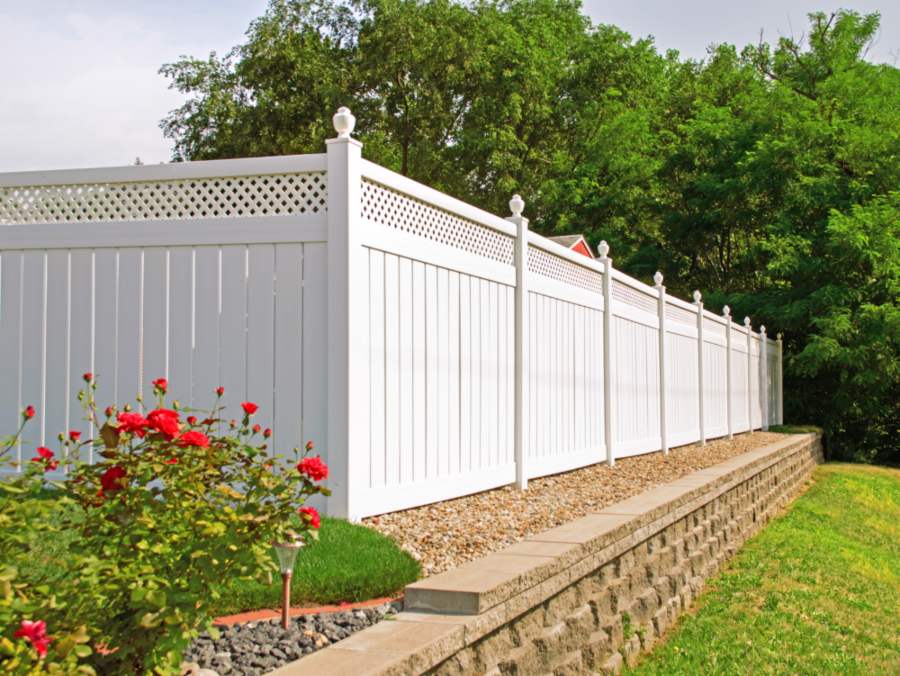Advantages of Vinyl Fencing Over Wood
Benefits of Vinyl Fencing Over Wood Fences
Both vinyl fences and wood fences can improve the privacy and security of your home, enhance its beauty, and increase its value. When choosing between these two fencing materials, consider your budget, aesthetic preferences, the architecture of your home, and the fencing materials used on other neighboring properties. Keep reading for a guide to the advantages of vinyl vs. wood fence and how to choose the fencing material that’s right for you.

Pros and Cons of Vinyl and Wood Fencing
There are pros and cons to both vinyl and wood fencing. Understanding the advantages and disadvantages of both can help you make a more informed decision:
- Vinyl Fencing – Vinyl is one of the most affordable and durable fencing options available. It is low-maintenance and easy to clean and care for. You won’t need to worry about rot, splinters, insect damage, water damage, or fading and discoloration. It can withstand extreme weather, including sun exposure, heat, cold, wind, snow, and rain. With proper care, it can last for decades. It is also safe, as it doesn’t splinter, rot, or warp. Some vinyl fences are more sustainable and eco-friendly than wood options. However, vinyl fencing is often more expensive and might be less customizable than wood. Because it lasts longer, you won’t need to pay as much for maintenance and repairs, which can offset the initial costs.
- Wood Fencing – Wood fencing is traditional, classic, and aesthetic. It can be easily customized using paint and stains. While it is vulnerable to water, pests, and weather damage, you can protect it by applying sealants or stains. Wood fences are easy to repair but do require more care and maintenance than vinyl. Depending on the wood species you choose, your fence may be more or less expensive than a vinyl fence. Cedar fencing is the most affordable and durable wood fence option.
How to Choose Between a Vinyl or Wood Fence
There are a number of factors to consider before investing in a vinyl or wood fence. A fencing company can give you estimates for both types of fencing and answer any questions you have. Here are some things to think about when choosing between a vinyl or wood fence:
- Cost – When you get an estimate for both types of fencing, you can better determine which one fits your budget.
- Lifespan – Consider the durability and longevity of each fencing material. While one might have a higher upfront cost, it may require a lower investment in maintenance and upkeep. A more expensive fencing material might last longer as well, meaning you won’t have to pay for new fencing for decades.
- Durability – Another factor to consider is how each fencing material can handle the weather and climate in your region. Consider how much rain and humidity your area gets, whether you regularly experience extreme temperatures, and whether your fence will be vulnerable to insect or animal damage.
- Appearance – Aesthetics will also play a huge role in your choice. The fencing material you choose should complement your home’s architecture or your personal taste. It also shouldn’t stand out among the other homes on your street or clash with other exterior materials and structures on your property.
- Maintenance Needs – Finally, consider how much time and money you want to invest in fencing maintenance. If you know you don’t have the time or patience for sanding, staining, sealing, or painting your fence, you may want to choose the most low-maintenance material available.
How Long Do Vinyl Fences Last Compared to Wood?
Certain species of wood, like cedar, can last 20 years or more. However, the lifespan of your wood fence depends on the quality of installation, where it is located, how much wear and tear it gets, and the weather in your area. If you don’t properly care for your wood fence, it also won’t last as long. Vinyl fencing can usually last 30 years or more, with some lasting over 50 years. They don’t require as much maintenance as wood and are typically more durable, especially in extreme temperatures and weather.
Choosing Between a Composite vs. Vinyl Fence
Composite fencing is another good alternative. Composite fences are made from a combination of wood fiber or pulp and recycled plastic. They are highly durable and resistant to weather, impact, pests, fading, and decay. You also have a lot of customization options. They are made to mimic the appearance of natural wood and can look almost identical to certain wood species. Composite fencing may have a higher upfront cost than vinyl fencing, however, and may be more susceptible to fading or discoloration. Composite materials are also more vulnerable to scratches and gouges.
Request an Estimate for Vinyl Fence Installation
Dick’s Evergreen Fence and Deck can give you estimates for wood fencing and vinyl fencing installation. We can go over the pros and cons of each and provide expert guidance to help you make your choice. We specialize in high-quality, durable wood fencing and vinyl fencing and offer expert installation for added longevity and security. Call us now or contact us online to schedule a fencing consultation in the Portland, OR, area.
